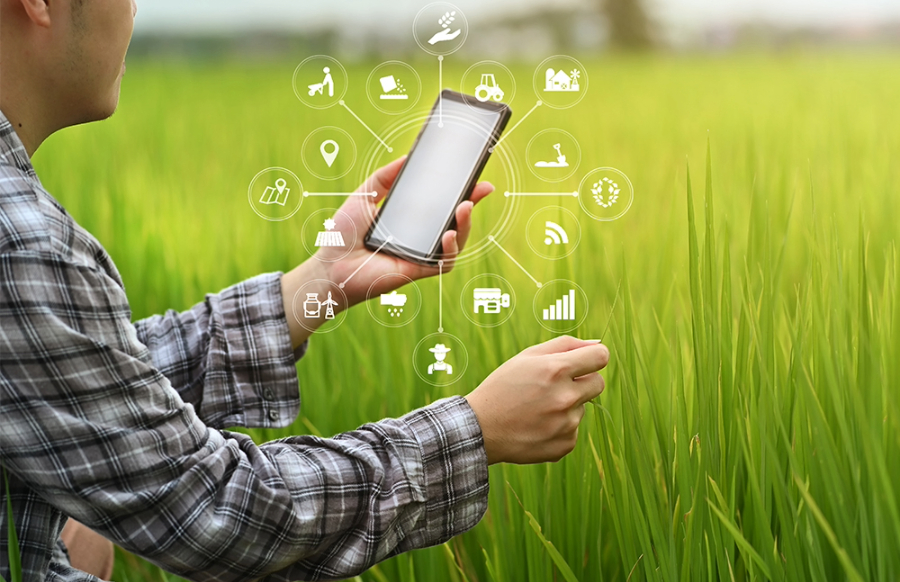Transforming Agriculture with AI-IoT Soil Testing
Emerging technologies such as Artificial Intelligence and the Internet of Things have transformed the manufacturing and retail sectors nowadays. Similarly, these technologies have created an impact on agriculture based on the transformation done in the methods by which the soil is tested. Soil testing aids farmers and agricultural scientists in identifying the deficiencies present in the soil and taking preventive actions for them. As a result of this, an Android app was developed to conduct 12 key soil parameter tests, for which the results were available within 30 minutes. The results were sent in a soil health card to the mobile devices of various stakeholders.
Cultivating Healthier Crops Using AI
AI plays a major role in assisting farmers to choose seeds suitable for specific weather conditions. AI is employed to promote the cultivation of healthier crops, manage pesticides, and soil conditions, and analyze the essentials of farmers, thereby improving the management of the food distribution network. Pesticides are commonly applied to agricultural areas, whether in open-air fields or within greenhouses, to enhance crop yields. Farmers are now utilizing Machine Learning (ML) to determine when, where, and which agrichemicals are to be applied. Accurate identification and classification of crop quality attributes are crucial for elevating product values and reducing wastage. Machines equipped with data-driven capabilities can detect and uncover new traits that significantly contribute to crop quality.
AI technologies have helped farmers in producing yield in crop cultivation and livestock production. AI and ML-based surveillance systems offer valuable insights for monitoring crops, detecting pests, and diagnosing soil issues. This technology empowers farmers to plant seeds at the optimal time, thereby maximizing yield. AI sensors can accurately identify weed-infested areas and recommend the most suitable herbicides for specific locations. Moreover, AI systems excel at forecasting weather patterns, assessing crop health, and identifying diseases, pests, or nutrient deficiencies. Farmers now can monitor their crop health using AI-powered drones. These drones capture images that are analyzed by experts, providing comprehensive health reports for farms and enabling effective pest control.
Precision agriculture based on IoT-Enabled Soil Nutrient Analysis
Ensuring robust and ample crop and food production is imperative in the face of global population growth. Decisions ranging from selecting appropriate crops, assessing seed availability, and analyzing market demand, to possessing comprehensive knowledge of crop cultivation are pivotal. Recent advancements, particularly in the realms of the Internet of Things, cloud computing, and machine learning, play a pivotal role in aiding farmers to analyze and enhance decision-making at every stage of cultivation. Following the selection of suitable crop seeds, farmers progress through seeding, monitoring crop growth, detecting diseases, identifying crop ripening stages, and eventually harvesting. The primary objective is to establish an ongoing support system for farmers, providing regular insights into their fields and crops, and empowering them to make informed decisions throughout the farming process.
This approach enables farmers to take decisive actions without complete reliance on local agriculture offices. An IoT-enabled soil nutrient classification and crop recommendation (IoTSNA-CR) model is designed to minimize fertilizer use and maximize productivity. This model encompasses various phases, including data collection from cultivation lands using IoT sensors, real-time data storage in cloud memory services, access through an Android application, and subsequent pre-processing and periodic analysis utilizing diverse learning techniques. A cost-optimized sensory system, comprising sensors such as soil temperature, moisture, water level, pH, GPS, and color sensors, coupled with an Arduino UNO board, facilitates the collection of essential data points.
Challenges to be considered for smart farming
As the Internet of Things (IoT) continues to permeate various aspects of our daily lives, including health, home automation, automotive, logistics, smart cities, and industrial settings, its application in agriculture has become a logical progression. The transformative influence of IoT, connected devices, and automation has extended to agriculture, bringing significant improvements to nearly every facet of the industry. In a world where self-driving cars and virtual reality are no longer confined to the realm of science fiction but are part of our everyday reality, relying on traditional methods like horses and plows in agriculture seems increasingly antiquated.
The agricultural sector has witnessed substantial technological advancements in recent decades, evolving into a more industrialized and technology-driven domain. Farmers now leverage a variety of smart agriculture gadgets, granting them enhanced control over livestock management and crop cultivation processes. The surging demand for agricultural products from consumers, coupled with these technological advancements, has led to the widespread adoption of smart farming technologies worldwide. In 2022, the market share for IoT in agriculture surged to an impressive $13.76 billion. This indicates a growing recognition of the benefits brought about by integrating IoT and smart technologies into agricultural practices, ultimately contributing to a more sustainable, efficient, and responsive farming industry.
Unleashing Agricultural Potential: AI-IoT Fusion Transforms Soil Testing
A groundbreaking solution poised to transform soil testing in agriculture has emerged through the integration of Artificial Intelligence and the Internet of Things (IoT). This innovative approach aims to simplify and expedite the identification and correction of soil deficiencies for farmers and agronomists. At the core of this pioneering system lies an Android app connected to a comprehensive platform capable of conducting twelve crucial soil parameter tests, providing results in just thirty minutes. The app efficiently transmits summarized outcomes through soil health cards to various stakeholders’ mobile devices.
Among the dozen parameters assessed by the system are vital factors like pH value, electrical conductivity, organic carbon, phosphorus, potassium, sulfur, nitrogen, and zinc. The compact machine, measuring 45x37x44 cm and weighing 12.55 kg, is priced at ₹2.12 lakh. This revolutionary technology, a collaborative effort between ICAR-IIRR and Krishitantra, is manufactured by HiMedia Laboratories and marketed by BhoomiSeva (HCF Tech Services Private Limited). RM Sundaram, Director of the Indian Institute of Rice Research (IIRR), underlined the significance of public-private collaborations in creating and commercializing products beneficial to farmers not only in India but also in other SAARC and Southeast Asian nations.
Source

